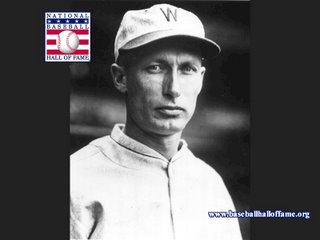
Nats320
Today, its one of the most famous written comments in baseball history. And, nearly 50 years passed before the truth was supposedly told. Only upon his death in 1974 did Washington Senators Hall Of Famer,Sam Rice, reveal what really happened on that bitter cold day in 1925.

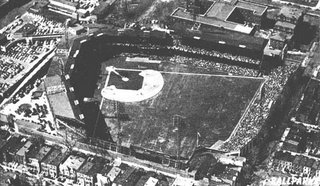
The Senators were in the midst of THE GREATEST 10 YEAR RUN in Washington Professional Baseball History. 3 American League Championships, 1 World Series Title--9 Future HALL OF FAMERS called Washington, DC, their home from 1924 through 1933. The Golden Years of Senators Baseball. In 1925, Washington was defending their ONLY World Series Title, against The Pittsburgh Pirates. Game 3 was re-scheduled, due to rain, for October 10th at Griffith Stadium (The Stadium Site--Now Howard University Hospital). The Series was tied at one game apiece.
Like most of the games in this hard fought 7 games series, Game 3 was a back and forth shuffle. The Pirates and Senators both had rallied to take the lead--Washington twice--and now led 4-3 heading to the top of the 8th inning. 36,495 faithful had braved the elements to watch this one. Little did they know, Baseball History was upon them. A Historical Moment never to be forgotten.
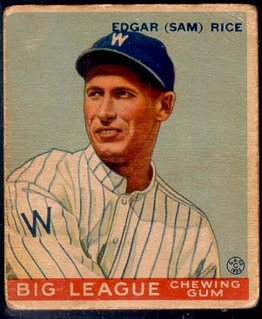
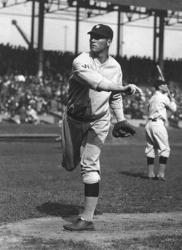
Sam Rice had started this game as Washington's Centerfielder. But, was moved to rightfield for defensive purposes during the pivotal top of the 8th inning. Senators Manager, Bucky Harris, brought on his CLOSER of the time (although no one used that moniker then), Firpo Marberry, completing a double switch--replacing Earl McNeely in Centerfield, sitting down Joe Harris, the starting right fielder. Joe Harris had just knocked in the go ahead run on a single to left, scoring Player-Manager Bucky Harris. The Senators were looking for The Victory to go up 2-1 in The World Series.

Marberry would strike out power hitting, run producing Pittsburgh shortstop, Glenn Wright. Then, get the same result on Pirates 3rd Baseman, George Grantham. Two outs, no one on base--journeyman catcher, Earl Smith stepped to the plate. The lefthanded hitting Smith against the right handed throwing Marberry. Umpire Cy Rigler was manning second base. And remember, this was years before MLB added two additional umpires down the lines to cover difficult outfield calls, during the World Series.
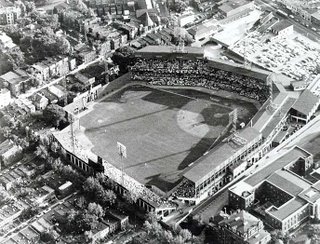
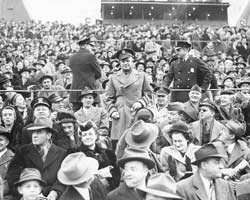
Smith would get ahold of a Marberry pitch and launch it toward right centerfield at Griffith Stadium-near the corner of The Gigantic Wall and the Left Field/Centerfield Stands. Rice, running from his right to left toward the corner, would leap and stab the ball, backhanded in his glove hand, right at the short railing and IMMEDIATELY tumble head first into the extremely close centerfield bleachers. And, DID NOT COME OUT OF THE STANDS for, by all accounts, 15 seconds. Umpire Rigler ran all the way out to centerfield, while fans attempted to pickup and assist Rice, no one claiming sight of the ball--at any time.. As Rigler arrived on the crash scene--Sam Rice brought up his glove hand-his left hand--showing the ball. Rigler called Earl Smith OUT!! AND, INSANITY RULED!!
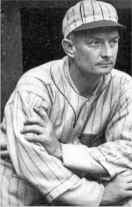
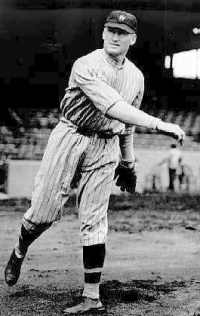
As Griffith Stadium erupted in cheer, and The Senators trotted off the field--Pirates Manager, Bill McKechnie went nuts--arguing the call for 15 minutes. Pittsburgh claimed Rice had dropped the ball upon tangling with the bleachers and fans. And, a Senators Fan had stuff the dropped loose ball into Sam's glove, before Umpire Rigler arrived at the scene. Rigler and the rest of the Umpire Crew, did not give ground. The play stood. Washington would go on to win this game, eventually go up 3-1 in this Series--but lose in heartbreaking fashion during Game 7. Washington's All Time Greatest Player, Walter Johnson, would lose 9-7 on a cold rainy day at Forbes Field in Pittsburgh. Some saying The Baseball Gods had served JUSTICE. Sady, it was to be Johnson's very last World Series appearance.
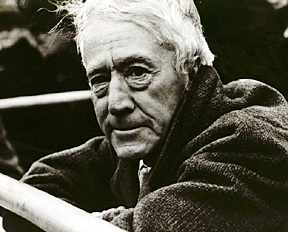
But, the controversial play in Game 3 was hot news. The Press was all over it. A news magazine offered him $2500 for the truth. "I don't need the money, " replied Rice. "The secret is more fun." Seemingly, every single baseball fan and official, alive, wanted to know the truth. Rice never relinquished. Over 1600 affidavits were filed, by game attendees, with Baseball Officals, claiming they knew the truth. The Pirates protested, directly to Major League Baseball and Sam Rice was called in front of The First Commissioner Of Baseball--Kenesaw Mountain Landis. A tough old buzzard, who oversaw the revitalization of Professional Baseball in wake of the BlackSox Scandal of 1919. Landis pointedly asked Rice whether he caught the now famous baseball. Sam, quiet and unassuming as always, replied he must have, "because the umpire said so." Commissioner Landis took his word, as a gentleman, closing the case.
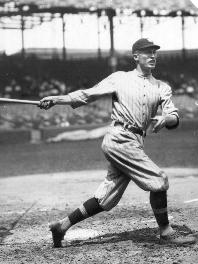
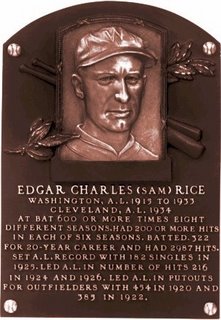
Though the incident was FAR FROM OVER.
For the remainder of his lifetime, Sam Rice was barraged with questions concerning that catch. A man of few words, Sam, (in his early 20's) had lost his entire family (a wife and two young children) in a tornado near his home town of Morocco, Indiana. Rice would never tell his second wife, about that tragic incident until the mid-1950's. And, only after she read the account of the deaths in a newspaper article.
Long retired and living on his farm in Rossmoor, Maryland, The Baseball Hall Of Fame would approach Rice in 1965 to give a written account of what happened on that famed October 10th, 1925 at Griffith Stadium in Washington, DC. In 1963, Rice had been elected to the Hall by The Veterans Committee. Hall Officials felt they had nothing to lose. Rice's reputation as one of The Greatest Players in History was now sealed.
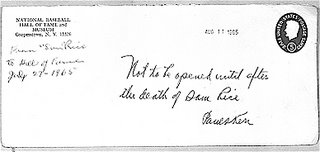
Rice agreed, and on July 26th 1965 wrote the now famous letter--instructing his remarks not to be opened until after his death. Sam Rice would live for over 9 more years, passing away on October 13, 1974 on his Maryland Farm. 49 years and 3 days after THE MOST FAMOUS MOMENT OF HIS LIFE!!
The Letter was opened. Once again showing brevity, even in death, Sam Rice wrote the following:
Monday, July 26 - 1965
"It was a cold and windy day - the rightfield bleachers were crowded with people in overcoats and wrapped in blankets, the ball was a line drive headed for the bleachers towards right center, I turned slightly to my right and had the ball in view all the way, going at top speed and about 15 feet from bleachers jumped as high as I could and back handed and the ball hit the center of pocket in glove (I had a death grip on it). I hit the ground about 5 feet from a barrier about 4 feet high in front of bleachers with all the brakes on but couldn't stop so I tried to jump it to land in the crowd but my feet hit the barrier about a foot from top and I toppled over on my stomach into first row of bleachers. I hit my adams apple on something which sort of knocked me out for a few seconds but [Senator outfielder Earl] McNeely arrived about that time and grabbed me by the shirt and pulled me out. I remember trotting back towards the infield still carrying the ball for about half way and then tossed it towards the pitchers mound. (How I have wished many times I had kept it.)"
"At no time did I lose possession of the ball. 'Sam' Rice"
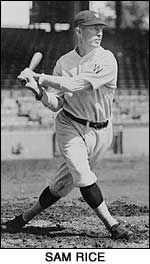

Believe it or not--Rice's After Death Letter, did not quell the controversy. Former teammate, Ossie Bluege, announced that Rice told him in 1972 he never caught the ball. And a letter, now on file in the Baseball Hall of Fame from a spectator at that game, Norman Budesheim--claims that Sam Rice had the ball in his glove when he left the field, but definitely dropped it when Rice crashed landed into Budesheim and his friend in the bleachers. Budesheim writing, Sam Rice is "generally and figuratively correct" in his famous line "at no time did I lose possession of the ball" ----In the scramble for the ball, by spectators, 'NO ONE ELSE TOUCHED IT!!'
The controversy still lives on today. Nearly 72 years after the event--nearly 33 years after Sam Rice passed away.
PS-Edgar was Sam's real name. Early on in his baseball career, a newspaper reporter wrote a game story and did not know Rice's given name, mistakenly using "Sam" instead. "Sam" stuck and he used it for the remainder of his life.
Over the next few months, I plan to chronicle each and every Hall of Famer Player/Manager with strong Washington Roots.
4 comments:
Maybe in light of the fact that Super Bowl XLI was played in the rain you could write another article about how game 7 of the 1925 World Series was played in a heavy rainstorm that should have called the game. In fact, it nearly was. Landis told Griffith in the sixth inning that he was calling the game and the Nats (who wear leading at the time) were world champions. Griffith said that since the game started in the rain, it had to finish in the rain. So it continued and the Pirates came back to win the Series.
I don't think any other owner would have done what Griffith did. However, he was probably right. Can you imagine the uproar today if the decisive game of a World Series ended this way? Of course with weather satellites, Selig would know in advance that heavier rain was coming so the game would probably not start, but if it did the controversy would be much bigger than what happened when the All-Star Game in Milwaukee ended in a tie...
You know, there is another Washington Senator Hall of Famer you should not forget. Johnson, Peckinpaugh, Rice, Harris, and Cronin are the HoFers most frequently associated with Washington, but there's another one, too---Heinie Manush. He played for several different ballclubs, but it was the Nationals he stayed the most years with, and the Nats are the only team where he appeared in the postseason. So why is he wearing a Detroit Tigers cap on his Hall of Fame plaque? I have no idea why...
One more thing. While it is true that Landis accepted Rice's answer, what he actually said was more interesting:
"Sam, did you catch the ball?"
"Judge, the umpire called Smitty out."
"That's exactly what I wanted you to say! And that's exactly the way I want you to answer anybody else asking you that question."
(Got this from Walter Johnson: Baseball's Big Train by Henry W. Thomas)
Great to see a blog paying due attention to DC's unfortunately somewhat forgotten because of a 34-year haitus but none-the-less storied and important baseball history! Also great to see "Walter Johnson: Baseball's Big Train" referenced - it's one of the best sports biographies ever written. All this is hevean to a lad who grew up in DC during the 1980s listening to tales of DC's baseball glory days from his 70 year old neighbor!
-HJMcK
Post a Comment